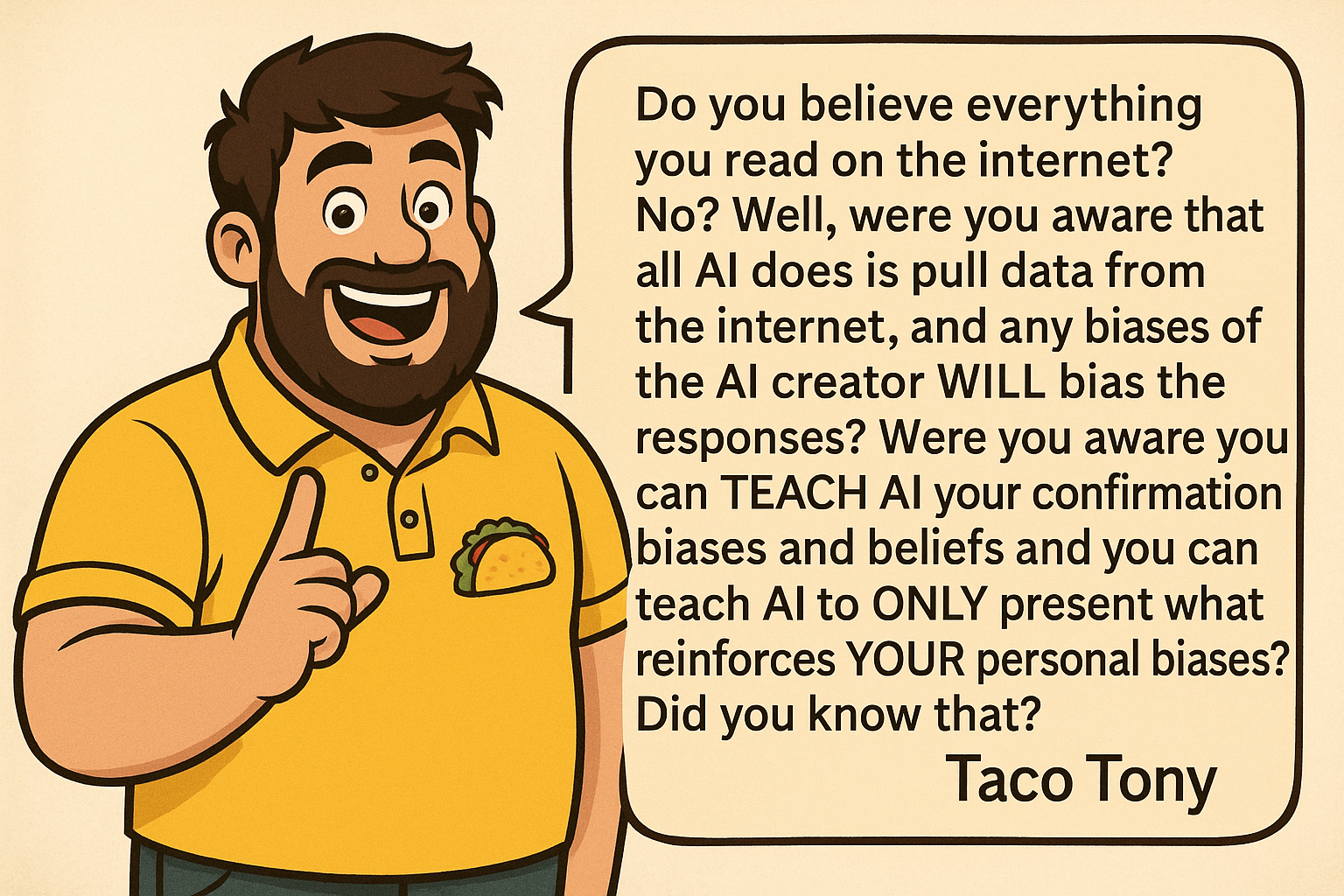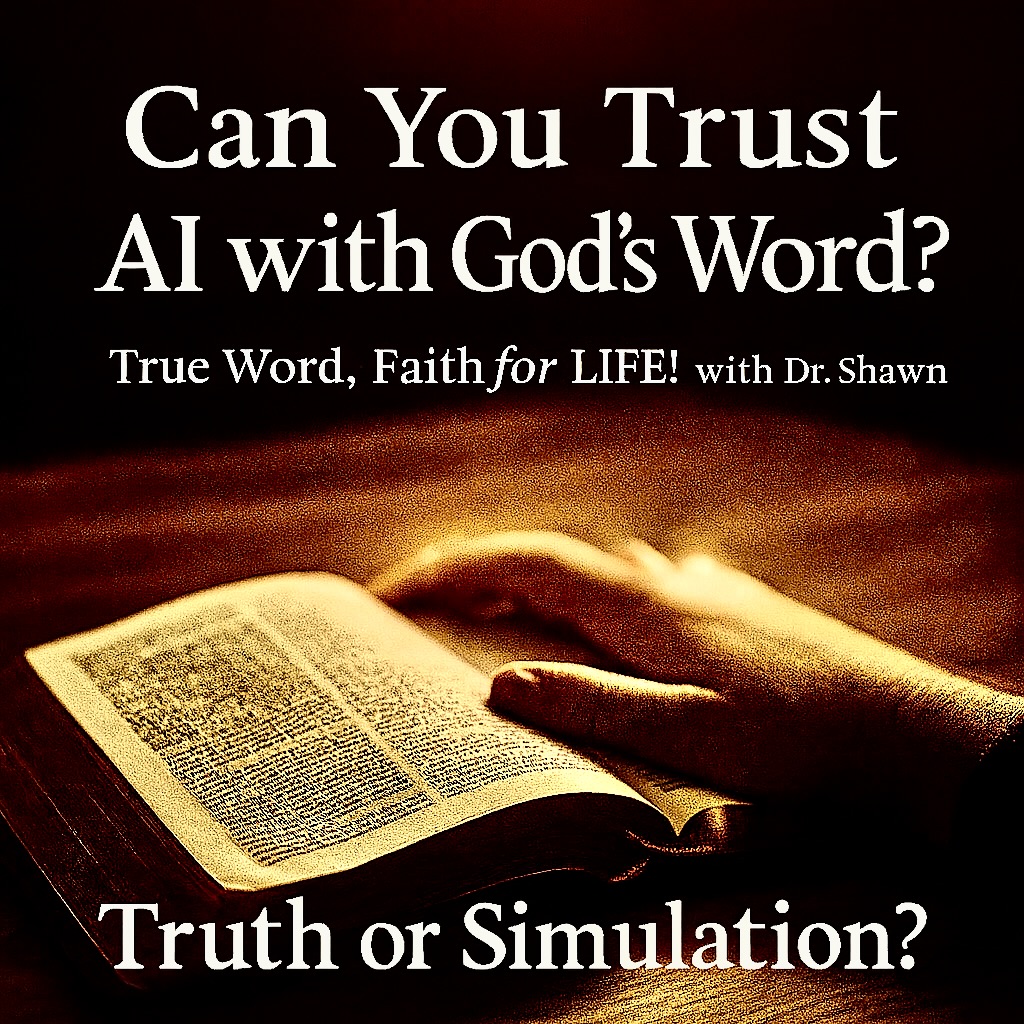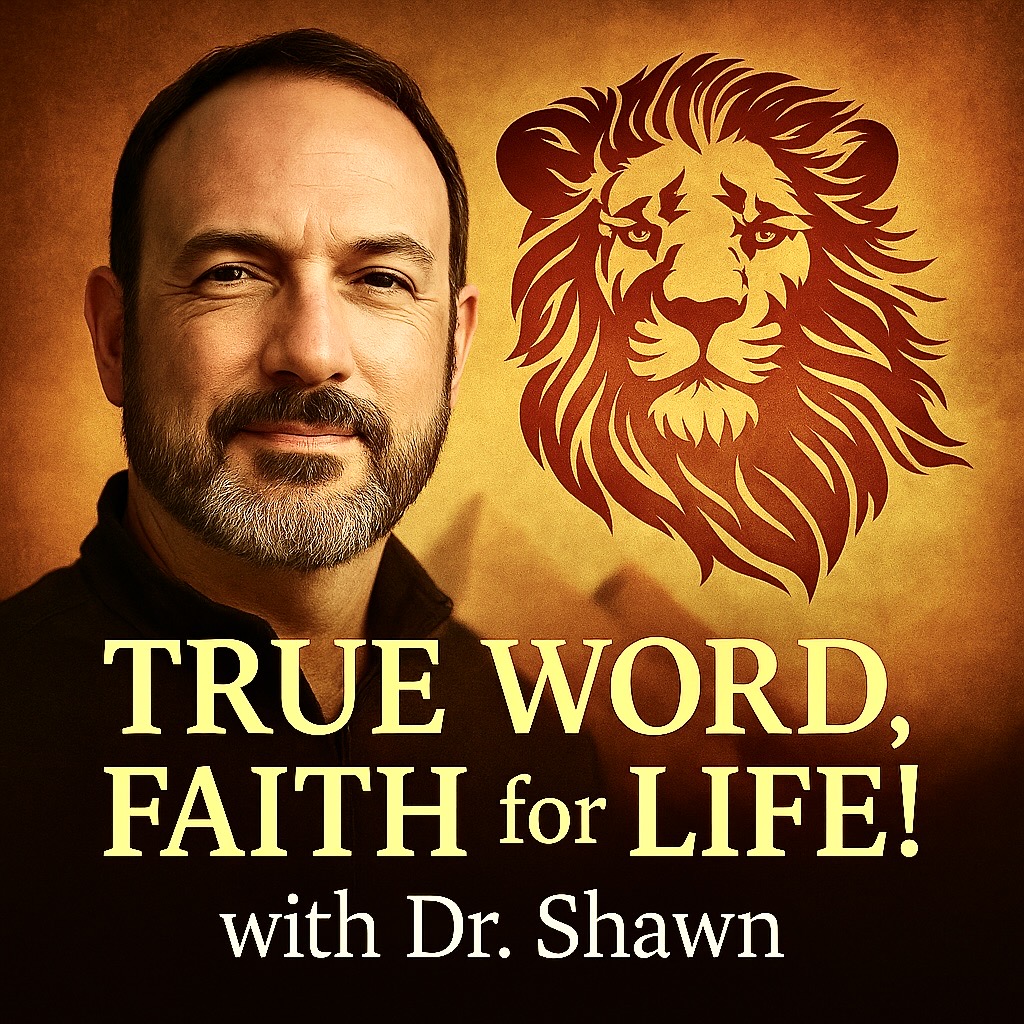Can You Trust AI with God’s Word? The Truth About the Talmud, Theology, and ChatGPT

Can You Trust AI with God’s Word?
The Truth About the Talmud, Theology, and ChatGPT
True Word, Faith for LIFE! with Dr. Shawn
https://www.youtube.com/live/qY7YBMHv9ZQ?si=5h0ML9f0wsMMJ8D8
Taco Tony recently said to me, Do you believe everything you read on the internet? No? Well, were you aware that all AI does is pull data from the internet, and any biases of the AI creator WILL bias the responses? Were you aware you can TEACH AI your confirmation biases and beliefs and you can teach AI to ONLY present what reinforces YOUR personal biases?
Did you know that? What happens when humanity starts asking machines to interpret the mind of God?
When algorithms trained on human opinion try to explain divine revelation?
In this episode, we confront a question that cuts to the heart of faith and discernment:
Can you trust AI with God’s Word?
Artificial intelligence can summarize Scripture, but it cannot discern truth. When technology begins to interpret theology without revelation, the result is confusion masquerading as clarity. This study explores why followers of the Way must never surrender the study of God’s Word to machines that cannot know the Author.
When the Digital Mind Meets the Divine Word
What happens when the machine that predicts your next sentence begins to explain God?
Across the internet, believers are turning to AI tools for Bible study, translation help, or even sermon writing. But beneath the convenience lies a deeper danger — one the early prophets could have called idolatry by intellect: creating a tool that mimics revelation but cannot feel the breath of the Spirit.
The question is not whether AI can access information. It can. The question is whether it can discern truth. And that is where the line between knowledge and wisdom becomes eternal.
“The fear of Adonai is the beginning of wisdom.” — Proverbs 9:10, CJB
Theology without fear of God is data. But theology born of covenant awe becomes life.
The Illusion of Authority
AI gives confident answers, even when it is wrong. That confidence — unearned, untested — has led many astray.
When asked to explain “The Talmud,” ChatGPT and other large language models often claim to summarize the book, as though it were a single, unified text. Yet the Talmud is not a book. It is a vast conversation — a living record of centuries of rabbinic wrestling with Torah and covenant life.
The Hebrew word Talmud comes from lamad, meaning “to learn.” It refers to generations of discussion and interpretation built upon the Mishnah, itself a codified oral tradition compiled around 200 CE by Rabbi Judah ha-Nasi.
There are two primary Talmuds:
- The Jerusalem Talmud (Talmud Yerushalmi, 300–400 CE), shorter, less edited, written in a blend of Hebrew and Western Aramaic.
- The Babylonian Talmud (Talmud Bavli, 450–600 CE), longer, written in Eastern Aramaic, and regarded as the authoritative text in Rabbinic Judaism.
When someone quotes “the Talmud,” they usually mean the Bavli. But even that version exists in hundreds of manuscripts and multiple critical editions.
AI doesn’t explain this. It compresses it — losing the sacred complexity of centuries.
Text Without Context Is Deception
There is no single master copy of the Talmud. The Munich Codex (1342 CE) is the only complete manuscript of the Babylonian Talmud; others survive only in fragments. Later printed editions — such as the Soncino (1483–86) and Bomberg (1520–23) — standardized the text layout still used today.
Modern critical editions like the Steinsaltz Talmud, the Schottenstein Edition, and the Koren Talmud Bavli each attempt to bridge linguistic gaps, but they also interpret. Every translation is an act of theology.
AI models, trained on internet data, rarely distinguish between authentic sources and anti-Semitic forgeries. That is how false “Talmud quotes” spread — statements claiming that Judaism endorses violence or immorality, when in truth those lines are fabricated or twisted from their original context.
For example:
- The claim “Even the best of Gentiles should be killed” does not appear in any canonical manuscript.
- “A Jew may have sex with a child under nine years old” is a distortion of a hypothetical legal argument meant to condemn such acts, not permit them.
- “Gentile girls are impure from birth” — a total fabrication.
These lies have been weaponized for centuries. AI, lacking discernment, often repeats them as fact because it does not know evil from error.
Why Theology Requires the Spirit
“Adonai, teach me Your ways, so that I may live in Your truth; make me single-hearted, so that I may fear Your name.” — Psalm 86:11, CJB
Theological study is not about data acquisition but relational encounter. The Hebrew word for “know,” yada, means intimate familiarity — the kind of knowing that transforms the knower.
Machines cannot yada. They can calculate, collate, and correlate. But they cannot commune.
This is why Paul warned that “knowledge puffs up, but love builds up” (1 Corinthians 8:1, LSB). True wisdom emerges not from information density but from the indwelling of Ruach HaKodesh, the Holy Spirit.
The Hidden Error Rate of Artificial Theology
AI’s error rate in theology is not just statistical — it is spiritual.
Even in well-documented areas, factual accuracy ranges between 70–90%. But in subjects like covenant theology, Second Temple Judaism, or Ancient Near Eastern linguistics, accuracy can fall as low as 40%.
That means a model could be wrong more often than it is right — and still sound convincing.
When asked to explain hesed, a Hebrew word meaning covenantal love and mercy, AI may define it as “kindness.” That is true but empty. Hesed is loyalty expressed through faithfulness within covenant relationship — the kind of love that holds even when betrayed.
AI cannot feel betrayal. It cannot feel faithfulness. It can only simulate both.
When Machines Become Commentators
In one recent example, a well-meaning pastor used ChatGPT to “fact-check” a teaching about the divine name YHWH. The AI confidently replied that “YHWH likely means He brings into existence whatever exists.” The statement sounds profound — but it ignored both the grammar and the theology of Exodus 3:14.
“Ehyeh asher ehyeh — I AM WHO I AM.” (Exodus 3:14, CJB)
As Dr. Michael Heiser and other scholars note, the root hayah conveys ongoing being and agency: I am the One who causes to be. This is covenantal language, not mere existence. AI’s paraphrase stripped away the covenantal self-disclosure of God and replaced it with philosophical abstraction.
This is what happens when data replaces devotion.
Before we go further, tell me in the comments:
Do you believe truth can exist without the Spirit of Truth?
When information becomes our idol, discernment becomes our casualty.
Why the Talmud Matters in This Discussion
The Talmud is not the Bible. It is a historical record of interpretation — sometimes right, sometimes wrong — but deeply valuable for understanding how ancient Israel wrestled with God’s Word.
Its debates about justice, purity, and ethics echo through Jewish and Christian thought alike. But to read it without cultural or linguistic grounding is to risk confusion.
That is why believers must approach such works through prayer, context, and scholarship — not automation. The Word of God is not a dataset. It is a covenant revelation.
“The Word of God is living and active, sharper than any two-edged sword.” — Hebrews 4:12, LSB
AI can replicate the words, but it cannot wield the sword.
The Challenge of Modern Study
In this digital age, information overwhelms. The temptation to delegate study to machines grows daily. Yet Scripture was never meant to be consumed passively.
In Hebraic culture, study (talmud Torah) is worship. Each word is turned, questioned, and lived. Ancient rabbis debated to draw near to God, not to out-argue their opponents.
When believers outsource that sacred labor to AI, we lose the intimacy of wrestling with revelation.
The Danger of Unchecked Confidence
AI can’t discern spiritual bias — yet it reflects the biases of its creators. If trained on secular or anti-biblical sources, it subtly reproduces skepticism toward Scripture and faith.
It might describe Jesus as “a Jewish moral teacher,” omitting His resurrection because secular academia often does. Without context, repetition becomes revision.
This is why discernment — binah in Hebrew — remains the believer’s shield.
“Do not be conformed to this world, but be transformed by the renewing of your mind.” — Romans 12:2, LSB
AI can conform the mind to patterns of the world. Only the Spirit can renew it.
Challenge and a Choice
So here is the question:
Will you allow convenience to replace communion?
Will you trust data to do what only discipleship can accomplish?
The choice is clear. Use technology as a tool — never as a teacher. Test every statement against Scripture. Seek wisdom in prayer, not in prediction.
The follower of the Way studies not to master the text, but to be mastered by it.
Prayer of Salvation
Heavenly Father, I come to You today with an open and humble heart.
I know that I have sinned and fallen short of Your glory, and I’m asking for Your forgiveness.
Right now, I turn away from my sins and turn fully toward You.
I believe that Jesus, Your Son, is the promised Messiah — that He died for my sins, was buried, and rose again on the third day just as the Scriptures say.
Today I call on Your holy Name. Please forgive me, cleanse me, and make me new.
Fill me with Your Holy Spirit and write Your truth on my heart.
From this day forward, I choose to follow Jesus as my Lord, my Redeemer, and my King.
Thank You for loving me, for saving me, and for making me part of Your family forever.
In the name of Jesus Christ, the King of Kings, I pray. Amen.
➡ “I am so excited for you because this decision is the most important of your existence! Contact me through TrueWordFaithforLife.com/contact and I will personally help you along the way!”
Before we close today, I want to ask you for one simple favor.
If this episode stirred your heart, if it helped you see God’s Word more clearly, or if it challenged you in your walk of faith, please don’t keep it to yourself!
Think of one person who needs encouragement, who needs truth, who needs hope. Send this episode to them right now. Be that friend who shares truth in a world filled with confusion.
And if you’re on social media, post the link to the episode, and let others know what blessed you. You never know who might be scrolling today and find exactly what they need to hear through your share.
Your share could be the very tool God uses to reach someone with His Word.
If you do NOT want to share this, please email me at smgreener@gmail.com and help me understand why not. No judgment — I simply want to know why after over 400 podcasts we are not growing and why listeners are not sharing these episodes.
Beloved, truth is not an algorithm — it is a Person. His Name is Yeshua. He is the Living Word that no machine can replicate, no database can contain, and no program can comprehend.
May His Word dwell richly in you, guiding your study, guarding your discernment, and grounding your heart in covenant faithfulness.
Shalom b’Shem Yeshua.
© 2025 Dr. Shawn M. Greener. All Rights Reserved.
True Word, Faith for LIFE! with Dr. Shawn
Footnotes
- Dr. Michael S. Heiser, The Unseen Realm: Recovering the Supernatural Worldview of the Bible (Lexham Press, 2015).
- Dr. Skip Moen, Guardian Angel: What You Must Know About God's Design for Women (At God's Table, 2013).
- Adin Steinsaltz, The Talmud: The Steinsaltz Edition (Random House, 1990).
- Sacred or Synthetic? Evaluating LLM Reliability in Theological Contexts, Journal of Digital Theology, 2025.
- MufassirQAS Project: AI Reliability in Religious Text Interpretation, 2024.
Bibliography
Heiser, Michael S. The Unseen Realm: Recovering the Supernatural Worldview of the Bible. Bellingham, WA: Lexham Press, 2015.
Moen, Skip. Guardian Angel: What You Must Know About God's Design for Women. Jacksonville, FL: At God's Table, 2013.
Steinsaltz, Adin. The Talmud: The Steinsaltz Edition. New York: Random House, 1990.
Sacred or Synthetic? Evaluating LLM Reliability in Theological Contexts. Journal of Digital Theology, 2025.
MufassirQAS Project: AI Reliability in Religious Text Interpretation. 2024.






